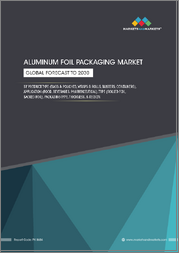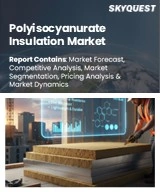
|
시장보고서
상품코드
1785399
알루미늄 프로파일 및 부속품 시장 - 산업 규모, 점유율, 동향, 기회, 예측 : 제품별, 최종 사용자별, 지역별, 경쟁별(2020-2030년)Aluminum Profiles And Accessories Market - Global Industry Size, Share, Trends, Opportunity, and Forecast, Segmented, By Product, By End-User, By Region, By Competition, 2020-2030F |
||||||
세계의 알루미늄 프로파일 및 부속품 시장은 2024년 573억 7,000만 달러로 평가되었으며, 2030년까지 922억 7,000만 달러에 이르고, CAGR 8.08%의 성장이 예측되고 있습니다.
알루미늄 프로파일 및 부속품 시장은 건설, 자동차, 운송, 일렉트로닉스, 에너지, 소비재 등 다양한 산업에서 널리 사용되는 알루미늄 압출 제품 및 관련 부품의 생산, 유통 및 응용을 다룹니다. 이러한 프로파일 및 부속품은 일반적으로 알루미늄을 로드, 바, 튜브, 앵글, 복잡한 맞춤형 형상과 같은 특정 단면 프로파일로 성형하는 압출 공정을 통해 제조되며 기존 재료를 대체하는 경량, 내식성, 고강도를 제공합니다.
| 시장 개요 | |
|---|---|
| 예측 기간 | 2026-2030년 |
| 시장 규모 : 2024년 | 573억 7,000만 달러 |
| 시장 규모 : 2030년 | 922억 7,000만 달러 |
| CAGR : 2025-2030년 | 8.08% |
| 급성장 부문 | 부속품 |
| 최대 시장 | 북미 |
이 시장에는 브래킷, 커넥터, 엔드 캡, 패스너, 장착 부품 등 프레임워크, 모듈식 어셈블리, 지원 시스템, 인클로저에서 프로파일의 구조적 사용을 보완하는 장착 부품 등 광범위한 액세서리가 포함되어 있습니다. 알루미늄의 재활용성, 높은 열전도성, 유리한 강도 대 중량비는 그린 빌딩 프로젝트, 전기자동차 부품, 태양전지판 프레임 및 산업 자동화 시스템에서 점점 더 선호되는 재료입니다. 급속한 도시화, 인프라 지출 증가, 에너지 효율적인 지속 가능한 건설 재료에 대한 수요가 증가함에 따라 표준화된 프로파일과 맞춤형 설계된 프로파일에 대한 수요가 증가하고 있습니다. 또한, 압출 기술과 합금 조성의 진보에 의해 정밀도의 향상, 표면 마감의 개선, 고하중·고온 용도에서의 성능 향상이 실현되고 있습니다.
또한 모듈 구조, 조립식, 경량 운송 장비에 대한 경향이 증가함에 따라 시장이 확대되고 있으며, 알루미늄 프로파일은 강성과 안전성을 유지하면서 전체 구조의 무게를 줄이는 데 중요한 역할을 하고 있습니다. 자동차 및 항공우주 분야에서는 엄격한 배출가스 규제와 연비규제를 충족시키기 위해 철강 부품을 대체하는 알루미늄 프로파일을 사용하는 경우가 늘고 있습니다. 전자 산업에서는 탁월한 열 관리 특성으로 인해 방열판과 섀시에서의 사용이 증가하고 있습니다. 액세서리 부문은 상업용 및 산업용 이용 사례 모두에서 조립이 쉽고 유연하며 재사용 가능한 부품에 대한 수요가 급증하고 큰 성장을 이루고 있습니다. 게다가 전자상거래와 창고 인프라의 확대는 알루미늄 기반 래킹과 스토리지 솔루션의 요구에 기여하고 있습니다.
주요 시장 성장 촉진요인
건설 및 인프라 부문에서의 수요 증가
주요 시장 과제
원재료 가격 변동
주요 시장 동향
지속 가능한 건축 및 건설 실천에서 알루미늄 형재의 채용 증가
목차
제1장 개요
제2장 조사 방법
제3장 주요 요약
제4장 고객의 목소리
제5장 세계의 알루미늄 프로파일 및 부속품 시장 전망
- 시장 규모와 예측
- 금액별
- 시장 점유율 및 예측
- 제품별(프로파일, 액세서리)
- 최종사용자별(헬스케어, 항공우주, 농업 및 재배)
- 지역별
- 기업별(2024년)
- 시장 맵
제6장 북미의 알루미늄 프로파일 및 부속품 시장 전망
- 시장 규모와 예측
- 시장 점유율 및 예측
- 북미 : 국가별 분석
- 미국
- 캐나다
- 멕시코
제7장 유럽의 알루미늄 프로파일 및 부속품 시장 전망
- 시장 규모와 예측
- 시장 점유율 및 예측
- 유럽 : 국가별 분석
- 독일
- 영국
- 이탈리아
- 프랑스
- 스페인
제8장 아시아태평양의 알루미늄 프로파일 및 부속품 시장 전망
- 시장 규모와 예측
- 시장 점유율 및 예측
- 아시아태평양 : 국가별 분석
- 중국
- 인도
- 일본
- 한국
- 호주
제9장 남미의 알루미늄 프로파일 및 부속품 시장 전망
- 시장 규모와 예측
- 시장 점유율 및 예측
- 남미 : 국가별 분석
- 브라질
- 아르헨티나
- 콜롬비아
제10장 중동 및 아프리카의 알루미늄 프로파일 및 부속품 시장 전망
- 시장 규모와 예측
- 시장 점유율 및 예측
- 중동 및 아프리카 : 국가별 분석
- 남아프리카
- 사우디아라비아
- 아랍에미리트(UAE)
- 쿠웨이트
- 튀르키예
제11장 시장 역학
- 성장 촉진요인
- 과제
제12장 시장 동향과 발전
- 합병과 인수
- 제품 출시
- 최근 동향
제13장 기업 프로파일
- Hydro Extrusions
- Arconic Corporation
- China Zhongwang Holdings Limited
- Novelis Inc.
- Jindal Aluminium Limited
- Gulf Extrusions Co. LLC
- Bonnell Aluminum
- ETEM Group
- Constellium SE
- FONNOV Aluminium
제14장 전략적 제안
제15장 기업 소개와 면책사항
JHS 25.08.13The Aluminum Profiles And Accessories Market was valued at USD 57.37 Billion in 2024 and is expected to reach USD 92.27 Billion by 2030 with a CAGR of 8.08%. The Aluminum Profiles and Accessories Market encompasses the global production, distribution, and application of extruded aluminum products and related components that are widely used across diverse industries such as construction, automotive, transportation, electronics, energy, and consumer goods. These profiles and accessories are typically manufactured through extrusion processes that shape aluminum into specific cross-sectional profiles, including rods, bars, tubes, angles, and complex custom geometries, offering lightweight, corrosion-resistant, and high-strength alternatives to traditional materials.
| Market Overview | |
|---|---|
| Forecast Period | 2026-2030 |
| Market Size 2024 | USD 57.37 Billion |
| Market Size 2030 | USD 92.27 Billion |
| CAGR 2025-2030 | 8.08% |
| Fastest Growing Segment | Accessories |
| Largest Market | North America |
The market includes a wide array of accessories such as brackets, connectors, end caps, fasteners, and mounting elements that complement the structural use of profiles in frameworks, modular assemblies, support systems, and enclosures. Aluminum's recyclability, high thermal conductivity, and favorable strength-to-weight ratio make it an increasingly preferred material in green building projects, electric vehicle components, solar panel frames, and industrial automation systems. Rapid urbanization, rising infrastructure spending, and growing demand for energy-efficient and sustainable construction materials are fueling the demand for standardized and custom-designed profiles. Moreover, advancements in extrusion technology and alloy compositions are enabling enhanced precision, improved surface finish, and better performance in high-load and high-temperature applications.
The market is also expanding with the growing trend toward modular construction, prefabrication, and lightweight transportation equipment, where aluminum profiles play a critical role in reducing overall structural weight while maintaining rigidity and safety. In the automotive and aerospace sectors, aluminum profiles are increasingly replacing steel parts to meet stringent emission and fuel efficiency norms. In the electronics industry, their use in heat sinks and chassis is rising due to their excellent thermal management properties. The accessories segment is experiencing significant growth as demand surges for easy-to-assemble, flexible, and reusable components in both commercial and industrial use cases. Additionally, the expansion of e-commerce and warehousing infrastructure is contributing to the need for aluminum-based racking and storage solutions.
Key Market Drivers
Increasing Demand from the Construction and Infrastructure Sector
The aluminum profiles and accessories market is significantly driven by the rising global demand in the construction and infrastructure sector, owing to aluminum's superior properties such as high strength-to-weight ratio, corrosion resistance, recyclability, and design flexibility. These characteristics make aluminum profiles highly suitable for structural applications including window frames, curtain walls, doors, facades, roofing systems, and modular architectural frameworks. In urban areas, there is a growing focus on energy-efficient and sustainable building designs that reduce environmental impact and align with green building codes, and aluminum plays a pivotal role in achieving these goals.
Rapid urbanization across developing economies in Asia-Pacific, the Middle East, Africa, and Latin America is leading to a surge in high-rise buildings, smart cities, and public infrastructure projects like airports, bridges, railways, and stadiums, all of which extensively use aluminum profiles for structural integrity and aesthetic appeal. Additionally, the increasing adoption of prefabricated and modular construction techniques is boosting the demand for standardized aluminum components and accessories that allow for easy assembly, disassembly, and transportation. Aluminum's durability and low maintenance costs further enhance its appeal to real estate developers and government bodies involved in public infrastructure projects. In commercial and residential construction, the growing trend of minimalistic and modern architectural designs is increasing the usage of sleek, extruded aluminum sections in balconies, interiors, and decorative applications.
The expansion of the real estate sector in emerging economies, supported by favorable government initiatives such as housing-for-all schemes, tax incentives for green buildings, and infrastructure development plans, is likely to sustain the demand for aluminum profiles in the long term. Moreover, aluminum profiles meet the evolving standards in terms of fire safety, sound insulation, and thermal performance, which are increasingly being mandated across global construction codes. With governments and private players investing heavily in post-pandemic infrastructure recovery and resilient building design, the need for strong, lightweight, and eco-friendly materials like aluminum profiles and accessories is poised to grow steadily, positioning the market for robust expansion over the next decade. The global construction industry is projected to surpass USD 15 trillion by 2030, driven by urbanization and infrastructure upgrades. Over 55% of the global population lives in urban areas, expected to reach 68% by 2050, fueling demand for new construction. Infrastructure spending is estimated to grow at over 6% CAGR globally, supported by public and private investments. The global demand for cement and concrete is rising steadily, with annual consumption exceeding 4 billion tons. Smart city initiatives are expanding worldwide, with more than 1,000 smart city projects currently underway across major economies. Global road and highway construction spending is expected to cross USD 3 trillion in the next five years. Emerging economies account for over 60% of the infrastructure development demand worldwide.
Key Market Challenges
Volatility in Raw Material Prices
The Aluminum Profiles and Accessories Market faces a significant challenge due to the volatility in raw material prices, particularly the price fluctuations of primary aluminum, which directly impact production costs and profit margins. The global aluminum market is heavily influenced by geopolitical tensions, trade policies, tariffs, mining regulations, and fluctuating energy prices, especially since aluminum smelting is an energy-intensive process. These unpredictable factors lead to inconsistent pricing structures, making it difficult for manufacturers to maintain stable pricing strategies or plan long-term investments. Small and medium-sized enterprises (SMEs), in particular, find it increasingly challenging to manage inventory and negotiate contracts under volatile cost conditions.
Moreover, price volatility leads to supply chain uncertainties as manufacturers often rely on international sources for raw aluminum, and disruptions in global trade-such as port closures, export restrictions, or logistical bottlenecks-exacerbate cost unpredictability. As aluminum is a key component in industries such as construction, automotive, aerospace, and consumer electronics, any significant surge in material prices trickles down the supply chain, impacting end-user affordability and demand elasticity. This results in reduced project margins, postponed orders, or a shift toward alternative materials, weakening the growth trajectory of the market. In addition, companies are under pressure to find cost-effective and sustainable sourcing strategies, but the increasing demand for certified low-carbon aluminum further tightens supply and drives prices up.
Efforts to recycle aluminum to mitigate raw material dependency are promising, but recycling infrastructure is still underdeveloped in many parts of the world, limiting its immediate impact. Consequently, pricing instability hampers the ability of manufacturers to scale operations, invest in innovation, or diversify offerings, ultimately affecting competitiveness. Companies are forced to adopt risk mitigation strategies such as hedging, short-term contracts, and buffer stock management, which add to operational complexity and cost.
Key Market Trends
Rising Adoption of Aluminum Profiles in Sustainable Building and Construction Practices
The global aluminum profiles and accessories market is experiencing a significant trend driven by the increased adoption of sustainable construction practices. As green building standards and energy efficiency regulations become more stringent across regions, builders and architects are increasingly choosing aluminum profiles for facades, curtain walls, doors, windows, partitions, and other architectural elements. Aluminum is lightweight, corrosion-resistant, and 100% recyclable, making it a preferred material for eco-conscious projects. It offers superior thermal performance when combined with thermal break technologies, contributing to reduced energy consumption in HVAC systems.
Additionally, its ability to be anodized or powder-coated enhances its aesthetic appeal and durability, aligning well with modern design trends. Modular construction methods are also becoming more prevalent, where pre-engineered aluminum profiles help speed up installation and minimize material waste. High-rise buildings, smart city infrastructure, and prefabricated housing developments are utilizing aluminum frames due to their adaptability and strength-to-weight ratio. Governments and urban planners are incentivizing energy-efficient materials, further driving the use of aluminum-based solutions.
Key Market Players
- Hydro Extrusions
- Arconic Corporation
- China Zhongwang Holdings Limited
- Novelis Inc.
- Jindal Aluminium Limited
- Gulf Extrusions Co. LLC
- Bonnell Aluminum
- ETEM Group
- Constellium SE
- FONNOV Aluminium
Report Scope:
In this report, the Global Aluminum Profiles And Accessories Market has been segmented into the following categories, in addition to the industry trends which have also been detailed below:
Aluminum Profiles And Accessories Market, By Product:
- Profiles
- Accessories
Aluminum Profiles And Accessories Market, By End-User:
- Healthcare
- Aerospace
- Agriculture & Cultivation
Aluminum Profiles And Accessories Market, By Region:
- North America
- United States
- Canada
- Mexico
- Europe
- France
- United Kingdom
- Italy
- Germany
- Spain
- Asia-Pacific
- China
- India
- Japan
- Australia
- South Korea
- South America
- Brazil
- Argentina
- Colombia
- Middle East & Africa
- South Africa
- Saudi Arabia
- UAE
- Kuwait
- Turkey
Competitive Landscape
Company Profiles: Detailed analysis of the major companies presents in the Global Aluminum Profiles And Accessories Market.
Available Customizations:
Global Aluminum Profiles And Accessories Market report with the given Market data, Tech Sci Research offers customizations according to a company's specific needs. The following customization options are available for the report:
Company Information
- Detailed analysis and profiling of additional Market players (up to five).
Table of Contents
1. Product Overview
- 1.1. Market Definition
- 1.2. Scope of the Market
- 1.2.1. Markets Covered
- 1.2.2. Years Considered for Study
- 1.3. Key Market Segmentations
2. Research Methodology
- 2.1. Objective of the Study
- 2.2. Baseline Methodology
- 2.3. Formulation of the Scope
- 2.4. Assumptions and Limitations
- 2.5. Sources of Research
- 2.5.1. Secondary Research
- 2.5.2. Primary Research
- 2.6. Approach for the Market Study
- 2.6.1. The Bottom-Up Approach
- 2.6.2. The Top-Down Approach
- 2.7. Methodology Followed for Calculation of Market Size & Market Shares
- 2.8. Forecasting Methodology
- 2.8.1. Data Triangulation & Validation
3. Executive Summary
- 3.1. Overview of the Market
- 3.2. Overview of Key Market Segmentations
- 3.3. Overview of Key Market Players
- 3.4. Overview of Key Regions/Countries
- 3.5. Overview of Market Drivers, Challenges, and Trends
4. Voice of Customer
5. Global Aluminum Profiles And Accessories Market Outlook
- 5.1. Market Size & Forecast
- 5.1.1. By Value
- 5.2. Market Share & Forecast
- 5.2.1. By Product (Profiles, Accessories)
- 5.2.2. By End-User (Healthcare, Aerospace, Agriculture & Cultivation)
- 5.2.3. By Region
- 5.3. By Company (2024)
- 5.4. Market Map
6. North America Aluminum Profiles And Accessories Market Outlook
- 6.1. Market Size & Forecast
- 6.1.1. By Value
- 6.2. Market Share & Forecast
- 6.2.1. By Product
- 6.2.2. By End-User
- 6.2.3. By Country
- 6.3. North America: Country Analysis
- 6.3.1. United States Aluminum Profiles And Accessories Market Outlook
- 6.3.1.1. Market Size & Forecast
- 6.3.1.1.1. By Value
- 6.3.1.2. Market Share & Forecast
- 6.3.1.2.1. By Product
- 6.3.1.2.2. By End-User
- 6.3.1.1. Market Size & Forecast
- 6.3.2. Canada Aluminum Profiles And Accessories Market Outlook
- 6.3.2.1. Market Size & Forecast
- 6.3.2.1.1. By Value
- 6.3.2.2. Market Share & Forecast
- 6.3.2.2.1. By Product
- 6.3.2.2.2. By End-User
- 6.3.2.1. Market Size & Forecast
- 6.3.3. Mexico Aluminum Profiles And Accessories Market Outlook
- 6.3.3.1. Market Size & Forecast
- 6.3.3.1.1. By Value
- 6.3.3.2. Market Share & Forecast
- 6.3.3.2.1. By Product
- 6.3.3.2.2. By End-User
- 6.3.3.1. Market Size & Forecast
- 6.3.1. United States Aluminum Profiles And Accessories Market Outlook
7. Europe Aluminum Profiles And Accessories Market Outlook
- 7.1. Market Size & Forecast
- 7.1.1. By Value
- 7.2. Market Share & Forecast
- 7.2.1. By Product
- 7.2.2. By End-User
- 7.2.3. By Country
- 7.3. Europe: Country Analysis
- 7.3.1. Germany Aluminum Profiles And Accessories Market Outlook
- 7.3.1.1. Market Size & Forecast
- 7.3.1.1.1. By Value
- 7.3.1.2. Market Share & Forecast
- 7.3.1.2.1. By Product
- 7.3.1.2.2. By End-User
- 7.3.1.1. Market Size & Forecast
- 7.3.2. United Kingdom Aluminum Profiles And Accessories Market Outlook
- 7.3.2.1. Market Size & Forecast
- 7.3.2.1.1. By Value
- 7.3.2.2. Market Share & Forecast
- 7.3.2.2.1. By Product
- 7.3.2.2.2. By End-User
- 7.3.2.1. Market Size & Forecast
- 7.3.3. Italy Aluminum Profiles And Accessories Market Outlook
- 7.3.3.1. Market Size & Forecast
- 7.3.3.1.1. By Value
- 7.3.3.2. Market Share & Forecast
- 7.3.3.2.1. By Product
- 7.3.3.2.2. By End-User
- 7.3.3.1. Market Size & Forecast
- 7.3.4. France Aluminum Profiles And Accessories Market Outlook
- 7.3.4.1. Market Size & Forecast
- 7.3.4.1.1. By Value
- 7.3.4.2. Market Share & Forecast
- 7.3.4.2.1. By Product
- 7.3.4.2.2. By End-User
- 7.3.4.1. Market Size & Forecast
- 7.3.5. Spain Aluminum Profiles And Accessories Market Outlook
- 7.3.5.1. Market Size & Forecast
- 7.3.5.1.1. By Value
- 7.3.5.2. Market Share & Forecast
- 7.3.5.2.1. By Product
- 7.3.5.2.2. By End-User
- 7.3.5.1. Market Size & Forecast
- 7.3.1. Germany Aluminum Profiles And Accessories Market Outlook
8. Asia-Pacific Aluminum Profiles And Accessories Market Outlook
- 8.1. Market Size & Forecast
- 8.1.1. By Value
- 8.2. Market Share & Forecast
- 8.2.1. By Product
- 8.2.2. By End-User
- 8.2.3. By Country
- 8.3. Asia-Pacific: Country Analysis
- 8.3.1. China Aluminum Profiles And Accessories Market Outlook
- 8.3.1.1. Market Size & Forecast
- 8.3.1.1.1. By Value
- 8.3.1.2. Market Share & Forecast
- 8.3.1.2.1. By Product
- 8.3.1.2.2. By End-User
- 8.3.1.1. Market Size & Forecast
- 8.3.2. India Aluminum Profiles And Accessories Market Outlook
- 8.3.2.1. Market Size & Forecast
- 8.3.2.1.1. By Value
- 8.3.2.2. Market Share & Forecast
- 8.3.2.2.1. By Product
- 8.3.2.2.2. By End-User
- 8.3.2.1. Market Size & Forecast
- 8.3.3. Japan Aluminum Profiles And Accessories Market Outlook
- 8.3.3.1. Market Size & Forecast
- 8.3.3.1.1. By Value
- 8.3.3.2. Market Share & Forecast
- 8.3.3.2.1. By Product
- 8.3.3.2.2. By End-User
- 8.3.3.1. Market Size & Forecast
- 8.3.4. South Korea Aluminum Profiles And Accessories Market Outlook
- 8.3.4.1. Market Size & Forecast
- 8.3.4.1.1. By Value
- 8.3.4.2. Market Share & Forecast
- 8.3.4.2.1. By Product
- 8.3.4.2.2. By End-User
- 8.3.4.1. Market Size & Forecast
- 8.3.5. Australia Aluminum Profiles And Accessories Market Outlook
- 8.3.5.1. Market Size & Forecast
- 8.3.5.1.1. By Value
- 8.3.5.2. Market Share & Forecast
- 8.3.5.2.1. By Product
- 8.3.5.2.2. By End-User
- 8.3.5.1. Market Size & Forecast
- 8.3.1. China Aluminum Profiles And Accessories Market Outlook
9. South America Aluminum Profiles And Accessories Market Outlook
- 9.1. Market Size & Forecast
- 9.1.1. By Value
- 9.2. Market Share & Forecast
- 9.2.1. By Product
- 9.2.2. By End-User
- 9.2.3. By Country
- 9.3. South America: Country Analysis
- 9.3.1. Brazil Aluminum Profiles And Accessories Market Outlook
- 9.3.1.1. Market Size & Forecast
- 9.3.1.1.1. By Value
- 9.3.1.2. Market Share & Forecast
- 9.3.1.2.1. By Product
- 9.3.1.2.2. By End-User
- 9.3.1.1. Market Size & Forecast
- 9.3.2. Argentina Aluminum Profiles And Accessories Market Outlook
- 9.3.2.1. Market Size & Forecast
- 9.3.2.1.1. By Value
- 9.3.2.2. Market Share & Forecast
- 9.3.2.2.1. By Product
- 9.3.2.2.2. By End-User
- 9.3.2.1. Market Size & Forecast
- 9.3.3. Colombia Aluminum Profiles And Accessories Market Outlook
- 9.3.3.1. Market Size & Forecast
- 9.3.3.1.1. By Value
- 9.3.3.2. Market Share & Forecast
- 9.3.3.2.1. By Product
- 9.3.3.2.2. By End-User
- 9.3.3.1. Market Size & Forecast
- 9.3.1. Brazil Aluminum Profiles And Accessories Market Outlook
10. Middle East and Africa Aluminum Profiles And Accessories Market Outlook
- 10.1. Market Size & Forecast
- 10.1.1. By Value
- 10.2. Market Share & Forecast
- 10.2.1. By Product
- 10.2.2. By End-User
- 10.2.3. By Country
- 10.3. Middle East and Africa: Country Analysis
- 10.3.1. South Africa Aluminum Profiles And Accessories Market Outlook
- 10.3.1.1. Market Size & Forecast
- 10.3.1.1.1. By Value
- 10.3.1.2. Market Share & Forecast
- 10.3.1.2.1. By Product
- 10.3.1.2.2. By End-User
- 10.3.1.1. Market Size & Forecast
- 10.3.2. Saudi Arabia Aluminum Profiles And Accessories Market Outlook
- 10.3.2.1. Market Size & Forecast
- 10.3.2.1.1. By Value
- 10.3.2.2. Market Share & Forecast
- 10.3.2.2.1. By Product
- 10.3.2.2.2. By End-User
- 10.3.2.1. Market Size & Forecast
- 10.3.3. UAE Aluminum Profiles And Accessories Market Outlook
- 10.3.3.1. Market Size & Forecast
- 10.3.3.1.1. By Value
- 10.3.3.2. Market Share & Forecast
- 10.3.3.2.1. By Product
- 10.3.3.2.2. By End-User
- 10.3.3.1. Market Size & Forecast
- 10.3.4. Kuwait Aluminum Profiles And Accessories Market Outlook
- 10.3.4.1. Market Size & Forecast
- 10.3.4.1.1. By Value
- 10.3.4.2. Market Share & Forecast
- 10.3.4.2.1. By Product
- 10.3.4.2.2. By End-User
- 10.3.4.1. Market Size & Forecast
- 10.3.5. Turkey Aluminum Profiles And Accessories Market Outlook
- 10.3.5.1. Market Size & Forecast
- 10.3.5.1.1. By Value
- 10.3.5.2. Market Share & Forecast
- 10.3.5.2.1. By Product
- 10.3.5.2.2. By End-User
- 10.3.5.1. Market Size & Forecast
- 10.3.1. South Africa Aluminum Profiles And Accessories Market Outlook
11. Market Dynamics
- 11.1. Drivers
- 11.2. Challenges
12. Market Trends & Developments
- 12.1. Merger & Acquisition (If Any)
- 12.2. Product Launches (If Any)
- 12.3. Recent Developments
13. Company Profiles
- 13.1. Hydro Extrusions
- 13.1.1. Business Overview
- 13.1.2. Key Revenue and Financials
- 13.1.3. Recent Developments
- 13.1.4. Key Personnel/Key Contact Person
- 13.1.5. Key Product/Services Offered
- 13.2. Arconic Corporation
- 13.3. China Zhongwang Holdings Limited
- 13.4. Novelis Inc.
- 13.5. Jindal Aluminium Limited
- 13.6. Gulf Extrusions Co. LLC
- 13.7. Bonnell Aluminum
- 13.8. ETEM Group
- 13.9. Constellium SE
- 13.10. FONNOV Aluminium
14. Strategic Recommendations
15. About Us & Disclaimer
(주말 및 공휴일 제외)


















